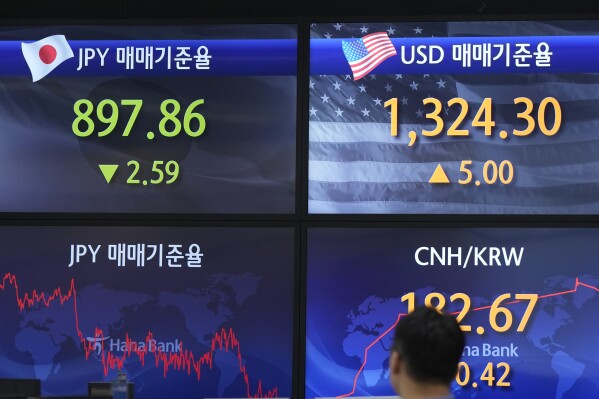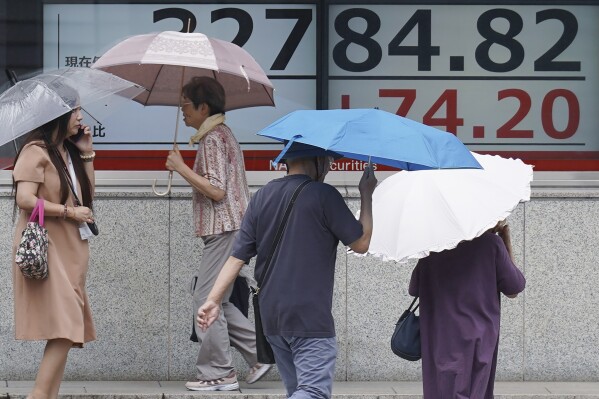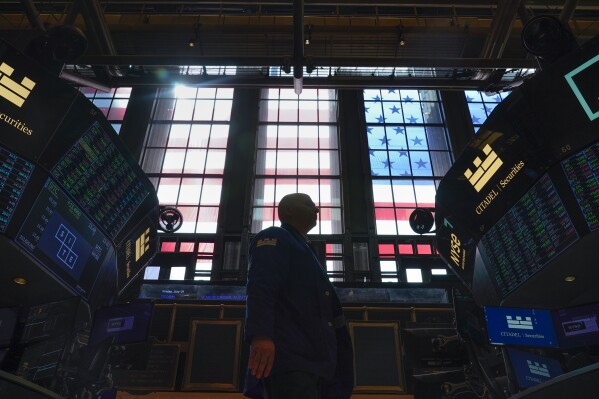Stock market today: Asian markets are mostly lower as oil prices push higher
Shares were mostly lower in Asia on Wednesday after a decline on Wall Street as traders returned from a long holiday weekend.
Japan’s Nikkei 225 index advanced but most other regional markets fell.
Crude oil prices pushed higher, adding to inflationary pressures at a time when investors are hoping to see central banks back away from interest rate hikes.
“While oil bulls are dancing in the street, the notable price uptick could prove challenging for central banks and financial markets, which were embellishing the current lower inflation groove,” Stephen Innes of SPI Asset Management said in a commentary.
 Stock market today: Asian markets are mostly lower as oil prices push higher
Stock market today: Asian markets are mostly lower as oil prices push higher
 Stock market today: World shares surge after Wall St gains on signs the US jobs market is cooling
Stock market today: World shares surge after Wall St gains on signs the US jobs market is cooling
 Stock market today: Wall Street edges higher following data that shows the labor market is cooling
Stock market today: Wall Street edges higher following data that shows the labor market is cooling
Coming off the Labor Day holiday in the U.S., investors have few economic reports to look forward to this week, while the latest round of corporate earnings is essentially finished.
Tokyo’s Nikkei 225 advanced 0.5% to 33,208.26. In Seoul, the Kospi declined 0.6% to 2,567.12.
The S&P/ASX 200 in Australia slipped 0.8% to 7,257.70 as the government reported the economy grew at a 2.3% annual pace in the last quarter. In quarterly terms, it expanded a modest 0.2%. The figures were better than expected.
Hong Kong’s Hang Seng index sank 0.8% to 18,306.24, extending losses as the market eases back from gains fueled by recent stimulus measures for the ailing Chinese property market.
The Shanghai Composite index shed 0.3% to 3,143.62. India’s Sensex edged 0.1% lower.
On Tuesday, the S&P 500 fell 0.4%, to 4,496.83, while the Dow Jones Industrial Average declined 0.6% to 34,641.97. The Nasdaq slipped 0.1% to 14,020.95, while the Russell 2000 slid 2.1% to 1,880.45.
Selling was widespread, with decliners outnumbering advancers by more than 3 to 1 on the New York Stock Exchange.
Losses in industrial, health care and financial stocks were the biggest drag on the benchmark S&P 500. Cintas fell 1.7%, Merck & Co. dropped 2.1% and JPMorgan Chase closed 1.1% lower.
Technology stocks were the biggest bright spot. Microsoft rose 1.5%.
Energy stocks rose along with crude oil prices after Saudi Arabia and Russia said they will extend their voluntary production cut of 1 million barrels of oil a day through the end of the year. Chevron rose 1.3%.
Early Wednesday, U.S. benchmark crude oil was up 1 cent at $86.70 a barrel in electronic trading on the New York Mercantile Exchange. It gained $1.44 on Tuesday.
Brent crude, the standard for international trading, was unchanged at $90.04 a barrel. It has risen to its highest level this year.
The Institute for Supply Management releases its latest report on the U.S. services sector on Wednesday. The services sector employs most Americans and is a big component of the economy. Its health could provide more insight into how inflation is affecting consumer spending.
Wall Street will also get updates on aspects of the manufacturing sector and consumer credit. DocuSign, GameStop, Dave & Buster’s and Kroger are set to report their most recent quarterly financial results this week.
Last week, investors were busy reviewing a heavy load of economic data as they try to get a better picture of the economy. Much of the information fueled hopes that the Fed might moderate interest rate increases to fight inflation, which has been easing for months.
Wall Street expects the Fed to hold its benchmark interest rate steady at its next meeting later in September, just as it did at its previous meeting. Investors are mostly betting that the central bank will maintain that pause through the rest of the year.
The central bank has raised its main interest rate aggressively since 2022 to the highest level since 2001. The goal has been to rein inflation back to the Fed’s target of 2%. Several measures of inflation have gotten closer to that target and the economy is still growing. That has alleviated concerns about the aggressive rate hikes pushing the economy into a recession.
Analysts are still concerned about the potential for a recession, but those concerns have lessened as inflation cools and the economy remains resilient.
In currency dealings, the dollar slipped to 147.44 Japanese yen from 147.73 yen late Tuesday. The euro rose to $1.0732 from $1.0721.
___
AP Business Writers Alex Veiga and Damian J. Troise contributed.
Disclaimer: The copyright of this article belongs to the original author. Reposting this article is solely for the purpose of information dissemination and does not constitute any investment advice. If there is any infringement, please contact us immediately. We will make corrections or deletions as necessary. Thank you.







